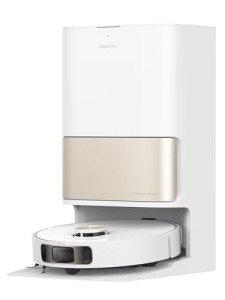16 Must-Follow Facebook Pages For Vacuums Robot-Related Businesses
The Rise of Robot Vacuums: A Comprehensive Guide
In recent years, robotic vacuum have transformed the method families keep tidiness. With Automatic Cleaning Machines ending up being advanced and accessible, they have gathered attention for their performance, convenience, and functions. This short article digs into what robotic vacuums offer, how they work, the advantages they offer, and the factors to consider buyers must keep in mind when picking one.
What Is a Robot Vacuum?
A robot vacuum is an automated, self-governing cleaning device developed to perform numerous cleaning tasks, generally concentrated on floor surface areas. They are geared up with sensors, brushes, and motors that allow them to navigate around spaces, avoid obstacles, and tidy efficiently. The advent of smart home technology even more enhances these devices' capabilities, allowing users to incorporate them into their home automation systems.
Kinds Of Robot Vacuums
Robot vacuums been available in numerous designs, each with special features and functionalities. Here are a few of the primary types:
Basic Models:
- Simple cleaning functions
- Random navigation patterns
- Lower price point
Mid-Range Models:
- Improved navigation systems (e.g., gyroscopic or sensor-based)
- Scheduling capabilities
- Moderate suction power
High-End Models:
- Advanced mapping and navigation abilities
- Smart features (Wi-Fi connection, combination with smart assistants)
- High suction power and specialized brushes for various surface areas
Functions to Consider
When choosing a robot vacuum, different features can improve user experience and general performance. Below is a list of vital features to think about:
Mapping Technology:
- Advanced models map out rooms, permitting efficient cleaning and room-specific settings.
Suction Power:
- Higher suction power can enhance performance on different surfaces, particularly carpets.
Battery Life:
- Longer battery life allows prolonged cleaning sessions. Look for designs that can return to charging stations when short on power.
Dustbin Capacity:
- Consider the size of the dustbin as it identifies how regularly it needs to be cleared.
Control Options:
- Many models offer mobile app integration and voice control compatibility. This permits remote operation and scheduling.
Barrier Detection:
- Advanced designs use cams and sensors to avoid challenges and avoid getting stuck.
Mopping Capability:
- Some robot vacuums include mopping functionality, offering a two-in-one cleaning service.
Advantages of Using a Robot Vacuum
Robot vacuums use a number of significant advantages over standard vacuums:
Convenience:
Users can set a cleaning schedule and let the vacuum do the work, maximizing important effort and time.Effectiveness:
Many models have intelligent navigation technology that enables them to tidy systematically, making sure no location is ignored.Accessibility:
Robot vacuums can reach under furnishings and other hard-to-reach locations, offering a more extensive cleaning experience.Allergen Reduction:
Regular vacuuming decreases dust, family pet hair, and allergens, improving indoor air quality, especially advantageous for allergic reaction sufferers.Programmable Cleaning:
Users can personalize cleaning schedules based upon their way of life, making sure homes remain tidy without manual intervention.
How Robot Vacuums Work
Understanding how a robot vacuum runs can help users optimize its potential. Below is a simplified overview of the working mechanism:
Sensors:
Robot vacuums are equipped with numerous sensing units to prevent crashes and navigate around furnishings. Infrared and cliff sensors avoid them from falling off stairs.Navigation and Mapping:
Basic models may utilize random navigation patterns, while advanced models use sophisticated mapping innovation to create a design of the home. They can determine areas that require specific attention, enhancing total efficiency.Cleaning Mechanisms:
Robot vacuums utilize brushes or rollers to upset dirt and debris, permitting the suction motor to gather the particles into a dustbin. Some include HEPA filters to trap irritants.Charge Cycle:
When the battery runs low, the robot vacuum can return to its docking station autonomously to charge, guaranteeing it's always ready for its next cleaning session.
Popular Brands of Robot Vacuums
With a growing market for robotic vacuums, several brand names standout for their development, client service, and item performance. Below are some of the leading brands:
Brand
Noteworthy Features
Price Range
iRobot Roomba
Smart mapping, Wi-Fi connectivity, strong suction
₤ 200 – ₤ 1,000
Roborock
Laser mapping, mopping feature, excellent battery life
₤ 300 – ₤ 900
Ecovacs D-Bot
Smart home integration, effective cleaning modes
₤ 250 – ₤ 600
Neato Robotics
D-shape design for corner cleaning, strong suction
₤ 400 – ₤ 800
Eufy
Budget-friendly alternatives, good suction power
₤ 150 – ₤ 400
Frequently Asked Questions (FAQs)
Can robot vacuums replace conventional vacuums?
Robot vacuums can considerably minimize the frequency of traditional vacuuming, however they may not totally change them due to restrictions on deep cleaning and larger debris. robotic vacuum cleaners of people use both for ideal results.
How frequently should a robot vacuum run?
A robot vacuum can be scheduled to clean everyday or numerous times a week, depending on lifestyle, family pet hair levels, and home foot traffic.
Are robot vacuums quiet?
Most robot vacuums are developed to operate silently, but noise levels might differ based upon the design and cleaning surface.
How do I maintain my robot vacuum?
Routine maintenance consists of emptying the dustbin, cleaning the filters, and examining the brushes for hair and particles. Occasionally, users may need to upgrade firmware.
Is it safe for pets?
Most robot vacuums are safe for pets, but making sure that they don't get tangled with long hair is vital. Functions like barrier detection can help prevent accidents.
Robot vacuums have actually become an innovative cleaning service that simplifies household maintenance. With effective cleaning paths, ease of use, and advanced innovation, they can fit flawlessly into contemporary way of lives. When choosing a robotic vacuum, buyers must think about various functions, types, and brands to find the best fit for their home's cleaning requirements. As innovation continues to develop, it's likely that the convenience and efficiency of robotic vacuums will just improve, making them a necessary appliance in every family.
